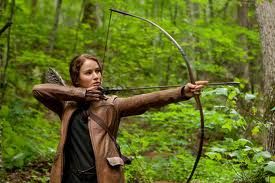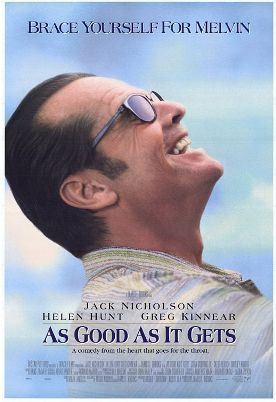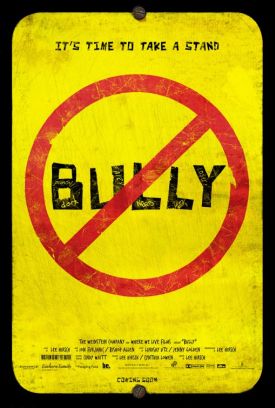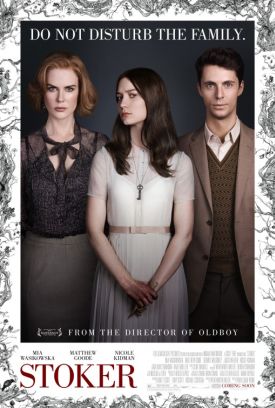Hunger Games, The
Artemis, also known as Diana the Huntress, lives on in The Hunger Games — a movie which, perhaps not coincidentally, has been setting box office records. The most evocative of the film’s publicity photos features the film’s star, the lovely but tough Jennifer Lawrence (Winter’s Bone) in the role of Katniss Everdeen, got up la Robin Hood in rustic costume and drawing back her bow to shoot at an unseen target. Even if that image in itself were not an inescapable reminder that Artemis was the goddess of virginity, the movie spells it out for us. Once, when the classical Diana and her attendant nymphs were spotted skinny-dipping in a woodland stream by a young hunter named Actaeon, she grew so cross with him that she turned the unfortunate fellow into a stag and had him torn to pieces by his own hounds. The supposedly 16-year-old Katniss proves her equal in savagery, repelling the sloppy lusts of peacetime even as she slaughters her coevals in the eponymous “games” for the amusement of the grown-ups of the future watching her on television.
Generally speaking, if I lived in the future I’m pretty sure I would be a bit more squeamish than these futuristic guys, who are sort-of-but-not-really modeled on ancient Romans, when it comes to watching children kill each other for sport on reality TV. I hope I would also have a better fashion sense than they do. But I can totally see what they find fascinating about the killing spree of the clean-limbed, athletic Katniss, whose Amazonian magnificence so much resembles that of Miss Joan Hunter Dunn and other 1930s tennis girls immortalized by the late Poet Laureate of Britain, Sir John Betjeman. Another model might have been found in a recent obituary in the British press of a young American swimmer, Shirley May France, who electrified the nation by failing to swim the channel in 1948:
Shirley May not only had a slender figure (though newspapers waxed lyrical about her “ample bosom”), she was also extremely pretty, with deep blue eyes, an upturned nose and a charming dimpled smile. It later emerged that her cross- Channel bid owed less to her own desire to break a record than to her father’s ambitions and the machinations of a press agent who could see a good story. As photographs of her swimsuit-clad figure appeared in every newspaper in America and Europe, there was talk of a Hollywood contract. The frenzy was heightened by a rumour (incorrect, to the disappointment of her admirers) that she intended to complete the swim in the nude. In the run-up to the great event, a sailor who fell off the flight deck of his aircraft carrier into the Mediterranean claimed that he had managed to stay afloat for 12 hours by thinking of Shirley May.
There’s something like reality TV, and you don’t have to go back to ancient Rome to get it! Like The Hunger Games, it even has a malevolent older generation in the person of an exploitative parent and press agent stage-managing the thing, though in 1948, apparently, they were less prudish about the sex.
That’s because the movie bears the stamp of its origins in the “young adult” fiction of Suzanne Collins, who collaborated on the screenplay. Anything like adult sexuality would have blurred the necessarily sharp line the movie draws between the tyrannical parent figures who sponsor and cheer on the child-killing game and their absurdly innocent victims. Of course, like most “dystopian” fantasies, the thing is a mess — and one which is not made any less messy by assurances that it all makes more sense in Ms Collins’s novels. There is a rather awkward account near the beginning of a primordial cataclysm and civil war — or maybe the cataclysm was the civil war — which resulted in the virtual enslavement by the winners of large numbers of the losers, from the youthful descendants of whom the contestants in the Hunger Games are still being chosen, as they have been for the previous seventy-four years, in order that their “sacrifice” may be the means for the whole society “to remember the past and protect the future.” Right. Whatever.
But if the fantastical drama doesn’t make any kind of naturalistic sense, there is a symbolic side to it, summed up in the Diana Huntress figure, and a child’s lively sense of the intersection of sex and danger is an inevitable subtext to this story of children being victimized by adults — as it is, too, in Katniss’s rather disturbingly chaste relationship with the ultimate in non-threatening boyfriends, Peeta Mellark (Josh Hutcherson). Even Peeta’s name is feminine. He escapes the hounds of Actaeon by turning himself into Katniss’s obedient puppy dog as the two of them are being hunted down by some very scary big kids with murder on their minds. As this is plainly intended as wish-fulfilment fantasy, however, not least in the politically correct pretense that girls — at least the girls of the future — are as good at fighting as boys are, it’s pretty hard for the movie to generate very much suspense about the outcome. Yet somehow, unlike Uma Thurman in Kill Bill Katniss manages to rise above the preposterousness of the drama into which she has been set and resemble something almost too real.
Gary Ross, a former Clinton speechwriter who also made the progressive parable, Pleasantville (1998), directs, and he misses few opportunities to diminish even further the picture’s already tenuous connections to reality — doubtless in the well-placed confidence that this is what his audience demands. Yet there is something rather splendid about the Diana-like Miss Lawrence that almost redeems it. Almost. In an era when it makes sense, if sense of an inevitably dubious and disagreeable kind, to talk of a “War Against Youth” this almost mythological image of savage innocence could be a worthy representative of her oppressed generational cohort, helpless under the burden of debt their baby-boomer parents have piled on their shoulders. And even if such a grotesque indulgence in adolescent paranoia as the Hunger Games fantasy of being forced to hunt each other with lethal force partially discredits the young folks’ just resentment of what their elders have done to them, it may nevertheless be a step in the right direction towards their recognition of their real grievance.
Discover more from James Bowman
Subscribe to get the latest posts to your email.








